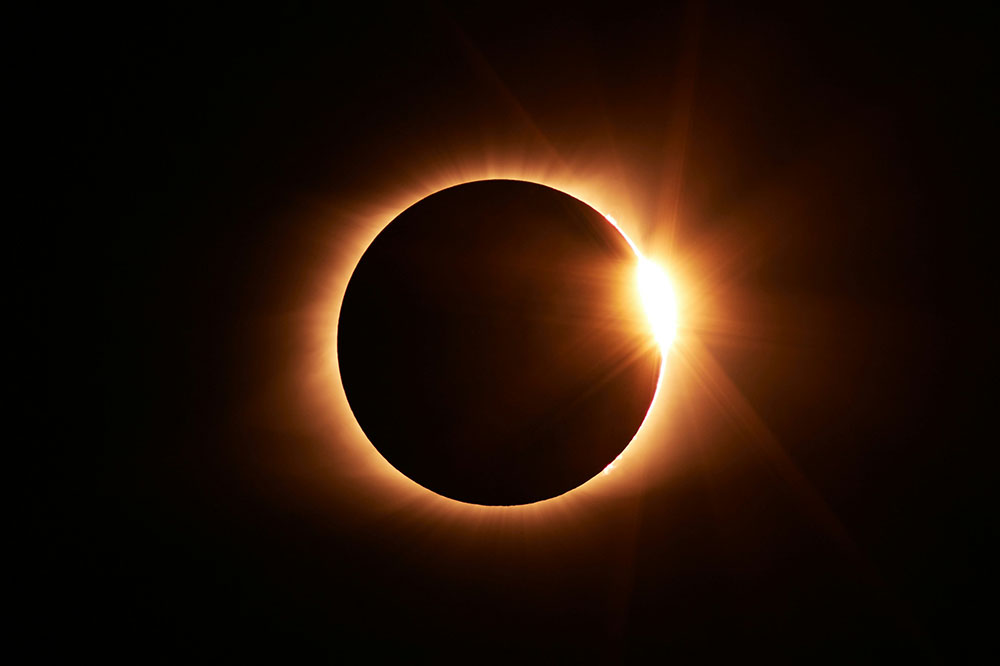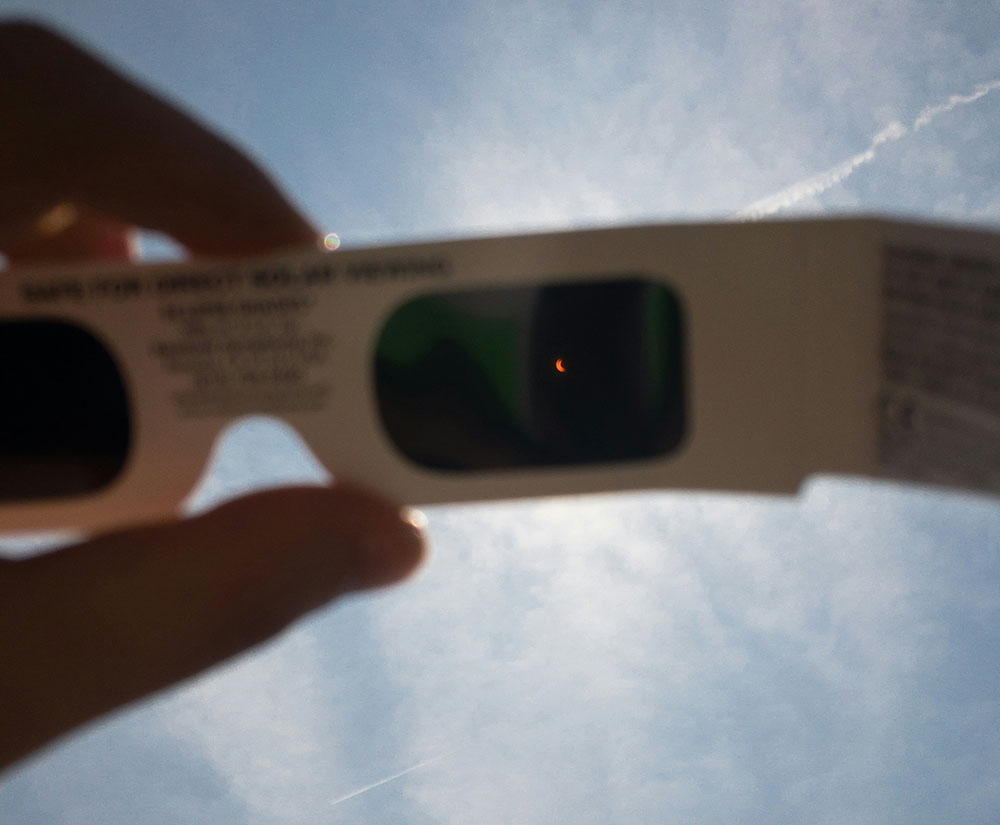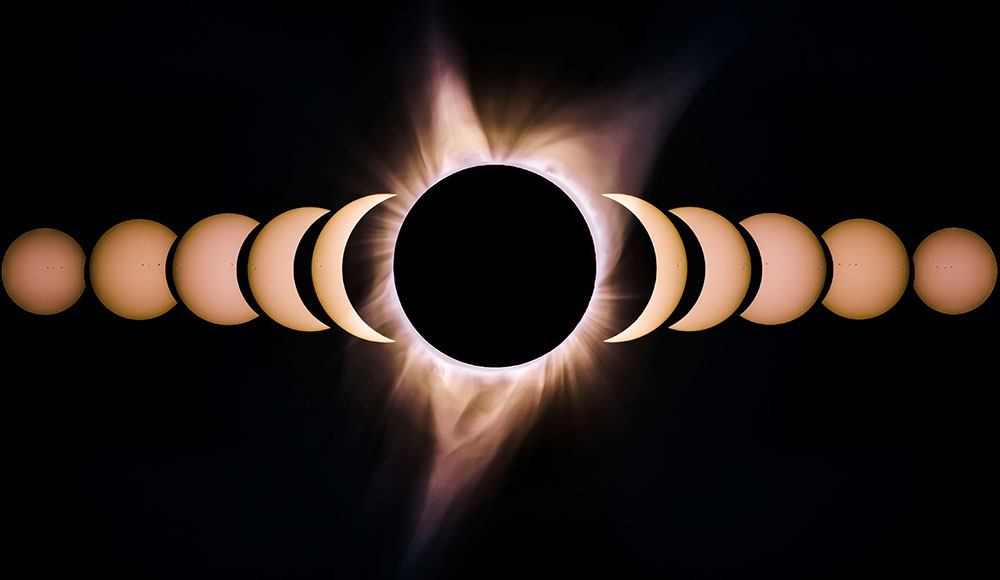A Total Solar Eclipse Over Canada
A total eclipse is set to occur on April 8, 2024, covering parts of Mexico, the United States and Canada. In Canada, we will experience the total eclipse from Southern Ontario to Newfoundland and Labrador, with the rest of country experiencing a partial eclipse. While this is a phenomenal event, it can also pose potential risks to eyesight if proper precautions are not taken. Even a brief sighting of a partly eclipsed Sun can result in harm to the eyes, so it is best to be aware of eye safety and safe viewing options.
What is a solar eclipse?
During a solar eclipse, the moon moves between the sun and the earth, partially or completely blocking the sun’s rays, resulting in either a total or partial eclipse. In a total eclipse, the sun, the moon, and the earth are all completely aligned resulting in the sun being obscured from view from the earth.
The danger lies in the fact that even during a partial eclipse, the Sun’s intense radiation can cause severe damage to the eyes.

What happens if you look at a solar eclipse?
Staring at the sun without proper eye protection can result in a condition called solar retinopathy or solar maculopathy. When your eyes are exposed to intense sunlight, the cells in the retina can become damaged and cause long-term vision issues and depending on how long you look at the sun without protection, it can even result in permanent vision loss.
Symptoms of solar retinopathy may not be immediate, but they can include:
- Blurry vision
- Reduced visual acuity
- Photophobia – Light sensitivity
- Scotoma – A blind spot in one or both eyes
- Dyschromatopsia – When you experience changes in how you see colors
- Metamorphopsia – When shapes or objects appear distorted
- Micropsia – When objects appear smaller than they actually are
- Headaches
Symptoms of solar retinopathy can happen within a few hours or a few days. It is important to know that you will not experience any pain because the retina does not have pain receptors; this makes it even more important to note any changes in your vision after viewing a solar eclipse.
Can you go blind from looking at a solar eclipse?
You won’t go completely blind from looking at the eclipse because the damage is limited to the central part of your visual field. Vision loss can occur, but you are more likely to notice a permanent blind spot or a sense of visual distortion. Most people’s vision usually improves on its own after a few months, but vision changes that have not improved after about six months are likely to be permanent.
How Your Eyes React During a Solar Eclipse
On any given day, the sun’s output is more powerful than our eye is designed to handle. What makes a solar eclipse particularly dangerous, is the fact that you don’t know exactly when the sun will come out from behind the moon before you have a chance to react and turn away. Your pupils naturally change in size to control how much light enters your eye. During an eclipse, your pupils will become dilated (larger) in order to allow more light in; so when the sun reappears in a burst of bright light, you may be caught staring straight at it with your eyes wide open.

How to safely view a solar eclipse
The only safe way to look directly at the sun during an eclipse is through special-purpose solar filters, like eclipse glasses or handheld solar viewers, and the only safe time to look at the sun with the naked eye is during the 2-4 minutes of total eclipse, known as totality. It is important to understand that only in these few minutes when the moon is fully blocking the sun is it safe to look at the total solar eclipse without proper eye protection. As soon as you see even a sliver of bright the sun reappear after totality, you must immediately put your eclipse glasses back on.
What to do (and not do) during a solar eclipse
From The American Astronomical Society:
- DO inspect all eclipse glasses and solar viewers before use.
- DO NOT use equipment with damaged lenses.
- DO keep your prescription glasses on when using eclipse glasses or a solar viewer.
- DO supervise young children to make sure they do not look at the eclipse without proper eye protection.
- DO NOT look at the eclipse through a phone, camera, telescope, or binoculars.
- DO NOT remove your eclipse glasses until the eclipse has completely finished and you are no longer looking at the sun.
- DO NOT use homemade eclipse glasses or ordinary sunglasses to view a solar eclipse.
A solar eclipse can be viewed safely by looking through special-purpose solar filters. These filters must meet an international standard, indicated by ISO 12312-2 certification
While there is no specific treatment for solar retinopathy, it is still important to see an eye doctor if you notice new changes in your vision after viewing a solar eclipse. Depending on the amount of damage incurred, it is possible to recover from solar retinopathy, but it can take weeks or months of healing.



